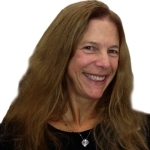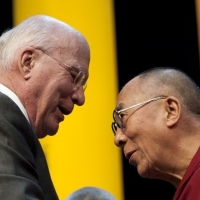 (Host) When the 14th Dalai Lama spoke at Middlebury College recently,
(Host) When the 14th Dalai Lama spoke at Middlebury College recently,
writer, book designer and commentator Dede Cummings was among those in
attendance.
(Cummings) Most people know that the 14th Dalai Lama
fled the takeover of Tibet by the Communist Chinese in 1959. He went
into exile in India, where he has remained ever since.
Born in
1935 in a Tibetan village close to the Chinese border, he was one of
seven siblings. Plucked from the family farm at just two years old, he
became the Tibetan religious and temporal leader at 15 .
Tibetan
photographer, Sonam Zoksang, of Kingston, NY , was one month old when
his parents carried him on their backs to escape the Chinese invasion,
leaving everything behind, on the run from guns – and almost certain
death. He says, " All the people followed the Dalai Lama." Then he adds,
"the Dalai Lama is precious to me, precious."
Now the Dalai
Lama is visiting Middlebury and I want to hear him speak. I spend the
night at a friend’s farmhouse in Weybridge. I leave for Nelson Arena in
the early morning darkness. Barn lights are on, a hard frost has made
the leaves brittle, and Orion is still bright in the sky. 
We
arrive at the College and await the charismatic leader. At last,
Middlebury College president Ron Liebowitz introduces Senator Patrick
Leahy. Then, two men approach the podium, holding hands. One is the
white-haired senator. The other is the saffron-clad monk – the Dalai
Lama. He bows over and over to the crowd – now on its feet – and I’m
struck by his humility.
Then the Dalai Lama tells a story. He
visits the perfect house, in America – a mansion, he says – and while
there peeks into a medicine cabinet where he finds a bottle of
tranquilizers. "So, you see," he says, "their life was not perfect, they
needed tranquilizers." And he roars with laughter at his own joke!
He calls upon us to work together, forget our political parties, and train our minds with discipline to achieve our utmost.
"I am just like you," he says and the audience collectively sighs.
"A
healthy mind is the most important element for a healthy body," he
adds, "If you help others, and serve others as much as you can, that’s
the proper way to lead a meaningful life."
He agrees that modern
life has become materialistic, but still he insists that "Everything is
connected, the whole world, and we must all, collectively, take action
to work for peace."
My devoutly Catholic mother once asked,
"What is mindfulness?" And I tried to explain. "Start where you are." I
said. " Be in the present." Now I think that wasn’t a bad answer, and
as I leave the sports arena, I feel connected, and try to hold onto the
moment.
The day is clear. We leave our cars and as we walk into
town, I shout to no one in particular, "The Dalai Lama is just like us!"
Nearby, young people on skateboards and bicycles laugh and turn
their heads towards us, as if they already know the meaning of those
words.